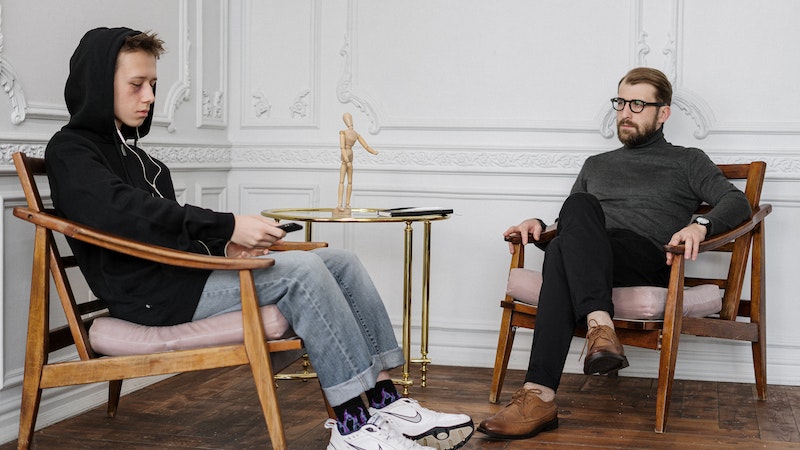Teenagers may benefit from attending a counseling session specifically designed to assist teens with worry and dread. Helping your adolescent deal with anxiety can be accomplished through a variety of strategies, including encouraging them to recognize and challenge erroneous beliefs, refraining from criticizing them, and finding healthy ways to express their emotions.
Adolescent Anxiety Symptoms
Teen counseling helps recognize the signs of anxiety in adolescents, even if they are not always obvious. The earlier you obtain help for a teenager, the better. When you seek assistance for your adolescent right away, they can begin the healing process faster.
Anxiety affects 20% of American teenagers. Teenage anxiety symptoms may also indicate the presence of depression. Anxiety problems in teenagers significantly increase the difficulty of daily life, including academics, social interactions, and extracurriculars. Teens with anxiety may have minor or severe symptoms. In extreme cases, teens may have physical symptoms including stomach aches or muscle tightness. Hyperventilation and headaches are also potentially possible side effects.
Causes of Teenage Anxiety
Childhood trauma increases adolescent susceptibility to anxiety symptoms. Abuse of any kind is traumatic, whether it is physical, mental, or sexual. A single catastrophic incident, such as the death of a loved one, can also trigger this condition.
Environmental factors, including the use of social media, have been linked to increased anxiety in adolescents. When a teen starts to believe they don’t measure up to their friends’ standards, that’s often the first sign of anxiety. Comparing themselves to others on social media frequently leads to teen depression.
As a parent, you may want to look into CBT for your child if he or she is exhibiting anxiety symptoms. Teens benefit from this therapy, which has been shown to work in adolescents because it teaches them to identify and control their symptoms. Additionally, it instructs students on how to handle stress in constructive ways.
The Slow Progression of Youth Anxiety Symptoms
Anxiety in adolescents often develops slowly over the course of weeks or months before it is recognized. When the symptoms become disruptive to your child’s routine, that’s when you’ll know they’re getting worse.
If you want to protect your adolescent from the onset of mental health conditions, it’s important to keep an open line of contact with them. Although it may be challenging, it’s crucial that you listen to your adolescent’s perspective. Praising your youngster frequently and picking out particular items to commend them on may also assist.
Teens’ Adaptation Mechanisms
Teens struggling with anxiety can benefit greatly from seeking out professional therapy. There are psychological, physiological, and social costs associated with anxiety. A child’s ability to learn, interact with others, and form relationships may all be negatively impacted.
Anxious teenagers often struggle with intrusive thoughts. Concerns about schoolwork, appearance, and social acceptance are also common. They may also experience feelings of embarrassment or confusion. There is a link between these emotions and the anger that they may feel.
Teens frequently look to their parents for help and direction. They could feel stuck since they don’t have anyone to talk to or anywhere to turn. However, if they have a strong sense of safety and security, they will be more open about sharing their emotions. Anxiety can be managed through the practice of self-compassion.
Controlling Thoughts Can Reduce Anxiety in Adolescents
Positive coping practices can help adolescents deal with anxiety. Methods such as counseling, medication, and learning to relax are all options. Patients have the option of joining a group therapy session as well. This style of group therapy is less formal and more collaborative.
Parents can also facilitate healthy adolescent emotional expression by providing a safe place for their children to talk about how they feel. They can express their inner ideas and emotions through journaling. They can get their thoughts in order and do some serious processing without necessarily having to write down their full stream of consciousness.
There should be a venue where teenagers can feel comfortable showing their artistic side. They could try their hand at some imaginative drawing or writing. Protect their anonymity and give them a safe space to express themselves without fear of reprisal.
If teenagers are not taught effective coping mechanisms, they are more likely to experience mental health issues including despair and anxiety. They might also be incapable of coming up with a positive approach to fixing the issue at hand.
Teens may have low levels of self-confidence and esteem. They may act impatient if they lack faith in their capacity to handle life’s pressures. These issues may persist throughout later life. Teens have a better chance of succeeding in life if their parents or therapists can teach them effective ways to deal with stress.
Recognizing one’s own unreasonable and frightening notions
It can be challenging for a youngster seeking help for anxiety to identify his or her own unreasonable and frightening ideas. However, it’s natural for kids to have crazy ideas sometimes. They’re an effective method of dealing with uncertainty that also helps them to be prepared for it. They could also be a sign of a psychological disorder if they persist or become violent.
Bipolar illness, schizophrenia, and obsessive-compulsive disorder are just a few of the mental health conditions that have been linked to irrational and frightening thought patterns. They should be reported to a qualified medical practitioner as they suggest the presence of a mental health issue.
Worrying, irrational thoughts frequently accompany anxiety symptoms. Tense muscles, headaches, stomachaches, and exhaustion are all possible side effects. In addition, they can make it difficult to concentrate in class and ruin social life.
Anxious Fears In Teenagers
Several methods exist for pinpointing the source of unreasonable fear. Adolescents with anxiety disorders can benefit from cognitive-behavioral treatment. The construction of a “ladder of unpleasant thoughts” is another method for recognizing one’s own unreasonable, fearful thoughts. This tactic entails analyzing the primary causes of your illogical fear.
One of the first steps in overcoming a fear is realizing that the concept is unreasonable and terrifying. It’s worth stressing that this method isn’t a quick remedy. Long-term psychotherapy may be necessary. It’s a good first step to becoming aware of your own unreasonable, upsetting thoughts, but teenagers also need to participate in some sort of therapy that teaches them how to control their thoughts.
Reducing the importance of unwanted thoughts is an effective treatment for anxiety disorders. You may notice that your anxiety subsides and you are able to carry on with life. Medication is another option for addressing disruptive thoughts.
To an adult, anxiety may seem unimportant, but it can have serious consequences for a youngster. Teens who suffer from severe anxiety often struggle in all areas of life, from academics to extracurriculars to relationships to getting enough sleep. Adolescents are more vulnerable to the development of anxiety and panic disorders as a result.
Refrain from passing judgment or shaming your teen.
Avoiding judgment, criticism, and humiliating your adolescent during counseling for anxiety is crucial. Teenagers are still learning and growing, and they don’t have much life experience. They could feel awkward or unworthy discussing their emotions and struggles. This may result in withdrawal and substance misuse.
In addition, teens who have suffered trauma may find it difficult to open up about what happened to them. They may also internalize the pain as their own fault. They will avoid anything that makes them feel uneasy, and they may be reluctant to confide in their parents.
Anxiety and sadness might develop if people don’t learn to deal with stressful situations. Suicidal ideation and actions are not out of the ordinary for adolescents struggling with these issues. They will need to feel heard and noticed, yet they might not know how to ask for assistance.
Counselors Help Teens Cope With Anxious Tendencies
A counselor who specializes in working with young adults can guide your adolescent through the process of working through his or her anxiety and developing strategies for managing it. While they might not be able to alter the adolescent’s emotions, they can assist the young person in becoming more self-aware and comfortable with their own sentiments.
Your teen can benefit from a therapist’s guidance in understanding the link between their thoughts and actions. As an added bonus, they can aid in the formation of healthy interpersonal relationships. The more supportive relationships a teen has, the less likely they are to feel ashamed of themselves.
Parents should make an effort to build trust with their adolescent children. They should be sympathetic to their worries and make it apparent that they stand ready to help. Likewise, they need to practice resolving conflicts peacefully.
Teenagers who struggle with mood disorders like anxiety and depression shouldn’t be stigmatized for expressing their emotions. They must have a sense of security and acceptance. They have to have a sense of acceptance and inclusion at school and in the neighborhood. They must also feel like they have a safe haven to retreat to when they are feeling unsafe. And they must feel like they have friends.Teen anxiety counseling and other forms of treatment can teach young people how to cope with the stresses of life. That’s the first step toward fixing their problems.





Leave a Reply